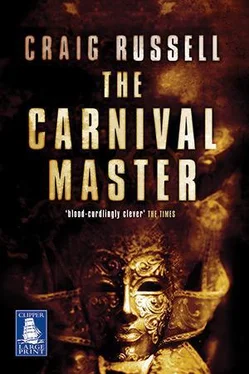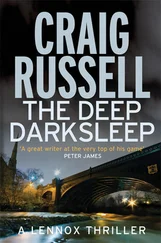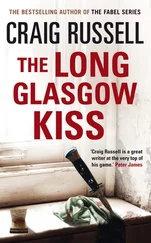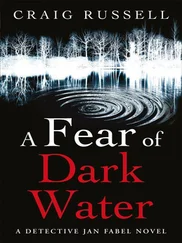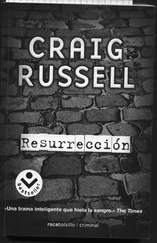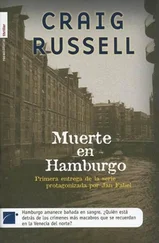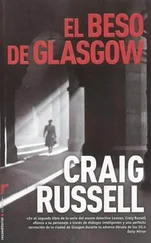Craig Russell - The Carnival Master
Здесь есть возможность читать онлайн «Craig Russell - The Carnival Master» весь текст электронной книги совершенно бесплатно (целиком полную версию без сокращений). В некоторых случаях можно слушать аудио, скачать через торрент в формате fb2 и присутствует краткое содержание. Жанр: Триллер, на английском языке. Описание произведения, (предисловие) а так же отзывы посетителей доступны на портале библиотеки ЛибКат.
- Название:The Carnival Master
- Автор:
- Жанр:
- Год:неизвестен
- ISBN:нет данных
- Рейтинг книги:3 / 5. Голосов: 1
-
Избранное:Добавить в избранное
- Отзывы:
-
Ваша оценка:
- 60
- 1
- 2
- 3
- 4
- 5
The Carnival Master: краткое содержание, описание и аннотация
Предлагаем к чтению аннотацию, описание, краткое содержание или предисловие (зависит от того, что написал сам автор книги «The Carnival Master»). Если вы не нашли необходимую информацию о книге — напишите в комментариях, мы постараемся отыскать её.
The Carnival Master — читать онлайн бесплатно полную книгу (весь текст) целиком
Ниже представлен текст книги, разбитый по страницам. Система сохранения места последней прочитанной страницы, позволяет с удобством читать онлайн бесплатно книгу «The Carnival Master», без необходимости каждый раз заново искать на чём Вы остановились. Поставьте закладку, и сможете в любой момент перейти на страницу, на которой закончили чтение.
Интервал:
Закладка:
‘He’s part of the organisation. Why wouldn’t he be here?’
‘Right organisation, wrong side of it. He’s a Molokov man.’ Buslenko was still looking at the black glass wall. ‘And it wasn’t Molokov in there behind the glass. Watching. It was the big guy himself. Vasyl Vitrenko. Some big business has brought him back. Something really big or he wouldn’t have left himself exposed. Even Kotkin’s far too senior to be recruiting thugs. He’d reached a level where he was becoming less and less visible.’
‘All I can say is that we’ve got this place sealed up as tight as a drum. Whoever you thought was in there couldn’t have got out.’ Ukrainian Beauty followed Buslenko’s gaze to the adjoining entertaining room. ‘It was always going to be a long shot, Taras. Our intelligence was contradictory. We had information that Vitrenko was back in Ukraine and we had equally sound intelligence that he is still in Germany.’
‘Well,’ said Buslenko, turning to face the beautiful Captain Olga Sarapenko of the Kiev police militia, who had made such a convincing nightclub hostess. ‘That was what my grandmother always said about the Devil: he has the craft to be in two places at the same time.’
5.
Fabel waited to be shown into Criminal Director van Heiden’s office and thought about how he would soon become someone else. And how everyone except Susanne seemed to be doing their best to talk him out of it. He guessed that van Heiden might be about to try again.
The whole idea of resigning from the Polizei Hamburg had been to get away from death. His entire career as a policeman had been founded on its violent intrusion into his life. The young Fabel had never considered being a police officer; with the absolute certainty of youth, Fabel had had his entire career as a historian planned out for himself. But then death, in its most sudden and violent form, had shouldered its way, unbidden, into Jan Fabel’s path.
It had happened while Fabel was still a student at the Universitat Hamburg. Fabel had only been dating Hanna Dorn, the daughter of his history professor, for a few weeks when she had been randomly selected by a psychopath as his next victim. He knew that Hanna Dorn, in her own right, would not have made that much of an impression on his life. Without the trauma of her murder, she would have faded from his consciousness long ago. They would, no doubt, have had a relationship that would have lasted a while: they would have gone to parties, eaten out when they could have afforded it, met with friends. But every time Fabel thought back to her, he knew that they would not have stayed together and that Hanna Dorn would have diminished into the far distance of his memory. A name that would have to be prompted into his recall. It had not been Hanna’s presence in his life that had marked Fabel for ever. It had been her sudden absence.
Fabel had moved on from trying to make sense of Hanna’s death to trying to make sense of the death of strangers. Fabel had come to know so many names, so many faces of the dead. As head of the Polizei Hamburg’s Murder Commission, Jan Fabel had spent his career getting to know people who were no longer capable of knowing him. He had become a master at reconstructing a life and a personality that was lost to everyone else; to walking in the footsteps of the murdered and understanding the minds of those who had killed them.
What had kept Fabel sane had been the fact that, throughout his career, he had always sought to keep death at arm’s length. He had never been entirely detached: it had always been his empathy for the victims that had given him that critical edge. But since Hanna’s murder, he had tried never to let death come too close to him. The last three cases had changed all that: one officer dead, one seriously wounded and mentally scarred. And twice more he had seen his officers placed in serious peril.
It was time to go. A chance encounter with an old schoolfriend had resulted in an offer of a job. More than a job. An escape into a normal life, whatever that was. To become someone else. It had been a monumental decision for Fabel. And now everyone was trying to talk him out of it. Everyone except Susanne. Susanne saw it as more than a change in Fabel’s career; she saw the opportunity to change the basis of their relationship.
Fabel’s superiors had, with great reluctance, agreed that he would leave the Polizei Hamburg’s Murder Commission at the end of the so-called ‘Hamburg Hairdresser’ case. It had been this case, piled onto the three other serial-killer investigations he had undertaken, that had led Fabel to the final decision to quit. There was, he had decided, just so much horror and fear that one could experience, only so much bearing witness as foul, corrupted and sick minds opened themselves up in front of you, before you started to become more and more like the thing you hunted.
Criminal Director Horst van Heiden was Fabel’s boss, in charge of Hamburg’s Criminal Police, the investigative branch of the Polizei Hamburg. Fabel had been surprised at van Heiden’s persistence in trying to persuade him not to resign. Fabel and van Heiden were, in many ways, opposites. Van Heiden was the typical career police officer, with a background in the force’s uniformed branch. Fabel still saw himself as the accidental detective: an outsider. And he liked to think that he held little regard for the formalities of his occupation.
When Fabel entered the Criminal Director’s office, there was a tall, lean man with prematurely greying hair whom Fabel didn’t recognise waiting with van Heiden.
‘Fabel… allow me to introduce Herr Wagner of the BKA…’ said van Heiden. Fabel shook hands with the federal agent. The BKA was the Bundeskriminalamt – Federal Crime Bureau – the law-enforcement agency with a brief that covered the whole of the Federal Republic. Fabel had worked with them on several occasions, but he had never before encountered Wagner. Maybe this wasn’t going to be all about van Heiden trying to persuade Fabel to remain in the Murder Commission after all. However, Fabel’s hope was dashed with van Heiden’s first utterance.
‘I’m not going to beat about the bush, Fabel.’ Van Heiden indicated that Fabel should be seated. ‘You know my feelings about your leaving the Polizei Hamburg. I would rather see you in another department than lose you completely.’
‘I appreciate that, Herr Criminal Director. But my mind is made up.’ Fabel did not try to suppress the weariness in his voice. ‘And, with respect, we’ve been through this before…’
Van Heiden bristled. ‘I didn’t bring you up here just to repeat myself, Fabel. Herr Wagner and I have something specific to discuss with you.’
‘With the greatest respect,’ said Wagner, ‘I don’t agree with Herr van Heiden that an alternative to you resigning from the Polizei Hamburg would be a transfer to another department. I know that you have successfully concluded four serial-murder cases in recent years.’
‘It depends on how you define “successfully”,’ said Fabel. ‘I have lost one officer and another has been so traumatised that she is currently on extended sick leave.’
‘How is Frau Klee?’ asked van Heiden.
‘Maria’s tough,’ said Fabel. ‘Very tough. I suppose in many ways that’s been her problem. She tried to simply work through what happened to her. Didn’t give herself enough time to recover from either her physical or emotional wounds. That’s why she’s crashed now.’
‘Frau Klee was seriously injured in the case in which Herr Fabel lost an officer.’ Van Heiden clearly felt that Wagner needed an explanation.
‘And a local uniformed policeman was killed as well,’ said Fabel.
‘Yes…’ Wagner frowned. ‘The Vitrenko case. Believe me, I am only too well acquainted with the exploits of our Ukrainian friend. Vasyl Vitrenko is at the top of our wanted list.’
Читать дальшеИнтервал:
Закладка:
Похожие книги на «The Carnival Master»
Представляем Вашему вниманию похожие книги на «The Carnival Master» списком для выбора. Мы отобрали схожую по названию и смыслу литературу в надежде предоставить читателям больше вариантов отыскать новые, интересные, ещё непрочитанные произведения.
Обсуждение, отзывы о книге «The Carnival Master» и просто собственные мнения читателей. Оставьте ваши комментарии, напишите, что Вы думаете о произведении, его смысле или главных героях. Укажите что конкретно понравилось, а что нет, и почему Вы так считаете.
